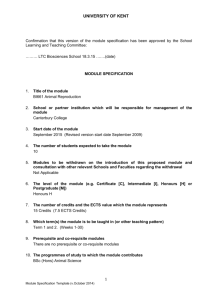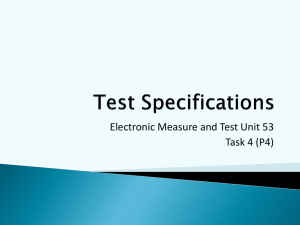University of Kent
advertisement
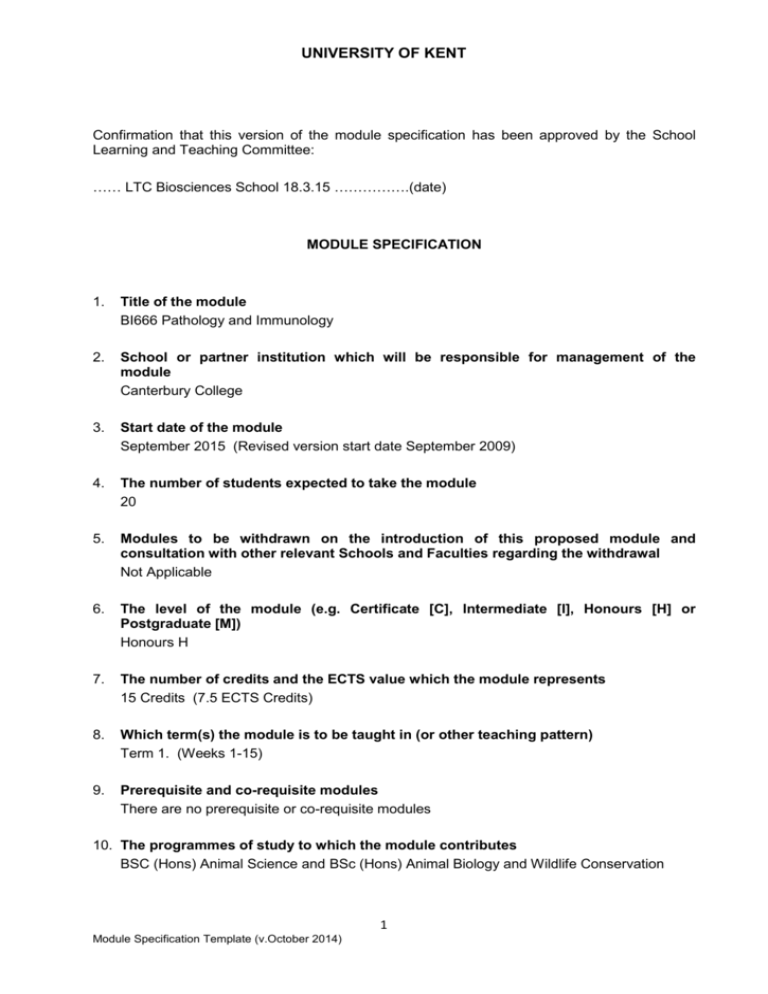
UNIVERSITY OF KENT Confirmation that this version of the module specification has been approved by the School Learning and Teaching Committee: …… LTC Biosciences School 18.3.15 …………….(date) MODULE SPECIFICATION 1. Title of the module BI666 Pathology and Immunology 2. School or partner institution which will be responsible for management of the module Canterbury College 3. Start date of the module September 2015 (Revised version start date September 2009) 4. The number of students expected to take the module 20 5. Modules to be withdrawn on the introduction of this proposed module and consultation with other relevant Schools and Faculties regarding the withdrawal Not Applicable 6. The level of the module (e.g. Certificate [C], Intermediate [I], Honours [H] or Postgraduate [M]) Honours H 7. The number of credits and the ECTS value which the module represents 15 Credits (7.5 ECTS Credits) 8. Which term(s) the module is to be taught in (or other teaching pattern) Term 1. (Weeks 1-15) 9. Prerequisite and co-requisite modules There are no prerequisite or co-requisite modules 10. The programmes of study to which the module contributes BSC (Hons) Animal Science and BSc (Hons) Animal Biology and Wildlife Conservation 1 Module Specification Template (v.October 2014) UNIVERSITY OF KENT 11. The intended subject specific learning outcomes On successfully completing the module students will be able to: 1. Apply detailed and coherent knowledge enabling critical analysis of the causes and processes of infectious disease and the animal body’s reaction to infectious agents 2. Apply detailed and coherent knowledge enabling critical analysis of the causes and processes of and the animal body’s reaction to non-infectious conditions 3. Apply detailed and coherent knowledge enabling critical analysis of the effects on the animal body of and the body’s reaction to trauma 4. Evaluate the roles of the immune system in the animal body’s defence against disease 12. The intended generic learning outcomes On successfully completing the module students will be able to: 1. Critically evaluate and abstract meaning from arguments, assumptions, concepts and data. 2. Work and study independently utilising initiative and taking personal responsibility 3. Work with complex information and concepts 4. Communicate information to both specialist and non-specialist audiences 5. Develop and enhance their numeracy and quantitative research skills 13. A synopsis of the curriculum The Indicative content will include topics such as: Disease processes in a variety of conditions affecting a range of animals. The causes of specific types of disease, their effects on animal bodies and the body’s reactions to them. Infectious agents of disease – bacteria, viruses, fungi, protozoa and multi-celled organisms Host-pathogen relationships and the physiological effects they cause. Causes of non-infectious disease, including metabolic and diet-related conditions The processes of disease and the animal body’s reactions. The effects of trauma and the body’s reaction to traumatic conditions. Bruising, wounds, fractures etc The animal body’s defences against a variety of diseases The immune system and its functions. A range of common diseases and conditions in a variety of species Disease principles and mechanisms. Contemporary case studies relating to animal disease in the media (for illustration and discussion.) 14. Indicative Reading List Cheville N F (2006) An Introduction to Veterinary Pathology, 3rd ed, New York:Wiley Blackwell McGavin M D & Zachary J F (2011) Pathologic Basis of Veterinary Disease, 5th ed, St Louis:Mosby, Playfair JHL & Chain B (2012) Immunology at a Glance, 10th ed, New York:Wiley Blackwell Tizard I (2008) Veterinary Immunology: An Introduction, 8th ed, St. Louis:Saunders Ltd, 2 Module Specification Template (v.October 2014) UNIVERSITY OF KENT 15. Learning and Teaching Methods, including the nature and number of contact hours and the total study hours which will be expected of students, and how these relate to achievement of the intended module learning outcomes Hours Subject LOs Generic LOs Lectures 21.5 11.1, 11.2, 11.3, 11.4 12.1, 12.2, 12.3, 12.4, 12.5 Seminars 21.5 11.1, 11.2, 11.3, 11.4 2 11.4 Independent study 105 11.1, 11.2, 11.3, 11.4 12.1, 12.2, 12.3, 12.4, 12.5 12.1, 12.2, 12.3, 12.4, 12.5 12.1, 12.2, 12.3, 12.4, 12.5 Total hours 150 Workshops 16. Assessment methods and how these relate to testing achievement of the intended module learning outcomes This module will be assessed by 50% coursework and 50% examination Weighting Time constrained assignment under exam conditions 50% Subject LOs 11.1, 11.2 Generic LOs 12.1, 12.2, 12.3, 12.4 1.5 hours Time constrained assignment infectious disease and non infectious disease Written assignment 50% 11.3, 11.4 1500 Words 12.1, 12.2, 12.3, 12.4, 12.5 Written assignment the immune system and the effects on the animal body of and the body’s reaction to trauma 17. Implications for learning resources, including staff, library, IT and space There are no additional implications for the HE study centre or LRC. 18. The Collaborative Partner recognises and has embedded the expectations of current disability equality legislation, and supports students with a declared disability or special educational need in its teaching. Within this module we will make reasonable adjustments wherever necessary, including additional or substitute materials, teaching modes or assessment methods for students who have declared and discussed their learning support needs. Arrangements for students with declared disabilities will be made on an individual basis, in consultation with the Collaborative Partner’s disability/dyslexia support service, and specialist support will be provided where needed. 3 Module Specification Template (v.October 2014) UNIVERSITY OF KENT 19. Campus(es) or Centre(s) where module will be delivered: Canterbury College If the module is part of a programme in a Partner College or Validated Institution, please complete sections 20 and 21. If the module is not part of a programme in a Partner College or Validated Institution these sections can be deleted. 20. Partner College/Validated Institution: Canterbury College 21. University School responsible for the programme: Biosciences School 4 Module Specification Template (v.October 2014)
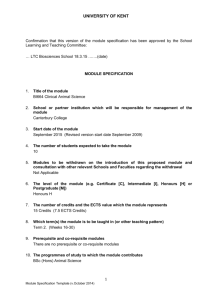
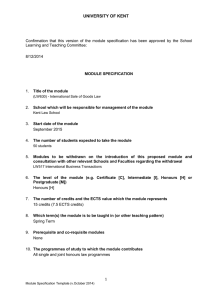
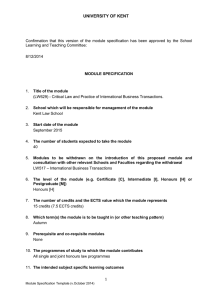
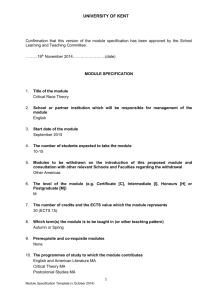
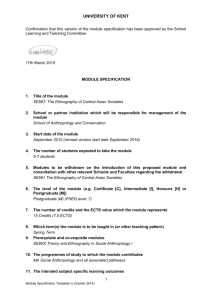
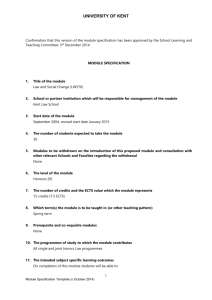
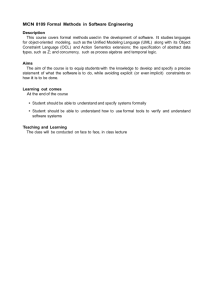
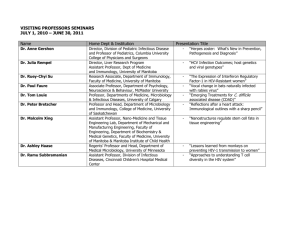
![EN665 [5] - University of Kent](http://s3.studylib.net/store/data/007665075_2-2a521757f83d879c30b96f0c1955e89a-300x300.png)

